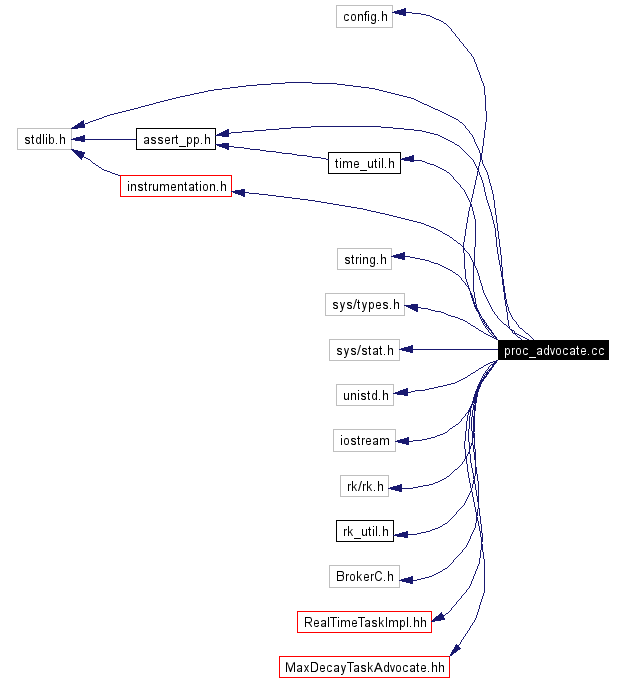
Definition in file proc_advocate.cc.
Include dependency graph for proc_advocate.cc:

Go to the source code of this file.
Defines | |
| #define | INSTR_proc_len LRTIME_INSTR |
| #define | INSTR_proc_len_data "proc_len", "the wall clock time" |
Enumerations | |
| enum | { PAB_DONE, PAB_CREATED_RESOURCE_SET, PAB_NO_OBSERVE } |
| enum | { PAF_DONE = (1L << PAB_DONE), PAF_CREATED_RESOURCE_SET = (1L << PAB_CREATED_RESOURCE_SET), PAF_NO_OBSERVE = (1L << PAB_NO_OBSERVE) } |
Functions | |
| void | sigchld (int sig) |
| Handle a SIGCHLD signal. | |
| void | sigpass (int sig) |
| A signal handler that passes the received signal on to the child process. | |
| void | sigalrm (int sig) |
| The SIGALRM signal handler. | |
| void | paUsage (const char *prog_name) |
| Print out the usage statement to standard error. | |
| int | paProcessOptions (int &argc_inout, char **&argv_inout) |
| Process the command line options. | |
| Broker::RealTimeTask_ptr | paGetAdvocate (CORBA::ORB_ptr orb, Broker::Manager_ptr manager, const char *task_ior, const char *task_name) |
| Create the advocate and begin CPU scheduling based on the command line parameters. | |
| int | paParentPart (Broker::RealTimeTask_ptr rtt) |
| The parent portion of the fork(2) between pa and the monitored utility. | |
| int | paChildPart (char *argv[]) |
| The child portion of the fork(2) between the proc_advocate and the monitored utility. | |
| int | main (int argc, char *argv[]) |
Variables | |
| iPoint | INSTR_proc_len_point |
| struct { | |
| PortableServer::POA_var pa_POA | |
| unsigned long pa_Flags | |
| const char * pa_ManagerIOR | |
| const char * pa_TaskIOR | |
| const char * pa_TaskName | |
| pid_t pa_ChildPID | |
| CORBA::ULong pa_ChildPeriod | |
| Broker::RealTimeTask_ptr pa_Advocate | |
| rk_resource_set_t pa_ResourceSet | |
| unsigned long long pa_LastUsage | |
| Broker::KeyedReportParameters pa_KeyedReportParameters | |
| } | pa_data |
|
|
The child portion of the fork(2) between the proc_advocate and the monitored utility. This function will execvp(3) the utility with the given arguments.
Definition at line 676 of file proc_advocate.cc. References ensure. |
|
||||||||||||||||||||
|
Create the advocate and begin CPU scheduling based on the command line parameters.
Definition at line 375 of file proc_advocate.cc. References ensure, manager, orb, require, rk_proc_get_rset(), rk_resource_set_create(), rk_resource_set_get_by_name(), rk_resource_set_get_usage(), rtt, and MaxDecayTaskAdvocate::SetDelegateAttribute(). |
Here is the call graph for this function:

|
|
The parent portion of the fork(2) between pa and the monitored utility. This function will attach itself to a resource set to ensure that it has some CPU time to work and then wait for gkrellm connections or the child's death.
Definition at line 518 of file proc_advocate.cc. |
|
||||||||||||
|
Process the command line options.
Definition at line 252 of file proc_advocate.cc. References string_to_microsec(). |
Here is the call graph for this function:

|
|
Print out the usage statement to standard error.
Definition at line 208 of file proc_advocate.cc. References require. |
|
|
The SIGALRM signal handler. This function will be called at the end of every period to report CPU usage to the advocate.
Definition at line 154 of file proc_advocate.cc. References NULL_RESOURCE_SET, ReportCPU(), require, and rk_resource_set_get_usage(). |
Here is the call graph for this function:

|
|
Handle a SIGCHLD signal. This function will be called when the child exits.
Definition at line 128 of file proc_advocate.cc. References require. |
|
|
A signal handler that passes the received signal on to the child process.
Definition at line 140 of file proc_advocate.cc. References require. |
|
|
Initial value: {
INSTR_proc_len_data,
}
Definition at line 46 of file proc_advocate.cc. |
 1.3.9.1
1.3.9.1